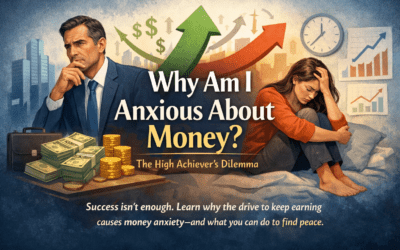We talk a lot about burnout in our culture. We tell each other to take time off, schedule self-care, unplug for a weekend. And while those things can soothe a tired body, they rarely touch the deeper fatigue that leaves you waking up just as drained as when you went to bed.
That kind of exhaustion isn’t cured by sleep or vacations. It’s mental exhaustion and it’s not about doing too much. It’s about being disconnected from yourself, from love, and from the truth of who you really are.
The Difference Between Being Tired and Being Empty
Physical tiredness is simple: your body uses energy and needs recovery. A long hike, a full day of travel, a big project, or a night of parenting a sick child, you collapse into bed and, after rest, you’re renewed.

Mental exhaustion, though, is different. You can sleep for ten hours and still wake up heavy. You can take a vacation and still feel hollow inside. You can tick off every “self-care” box and yet feel no spark of vitality returning.
Why? Because mental exhaustion is a spiritual malady disguised as fatigue.
It’s what happens when the mind has been fighting reality for too long.
The Real Source of Mental Exhaustion
Most of us assume we’re exhausted because of what we do, our jobs, our kids, our relationships, our never-ending to-do lists. But the deeper cause isn’t activity itself.

It’s the inner resistance to what’s happening.
It’s the endless stream of judgments, comparisons, and attempts to control outcomes that are never really ours to control.
As I often remind my clients, you don’t burn out from what you’re doing; you burn out from what you’re resisting while doing it.
Every time you replay a conversation in your mind, argue with how someone “should” have behaved, or carry resentment for what wasn’t fair, you spend emotional energy as if you were holding a muscle contraction for hours. Eventually, your nervous system gives out, not from movement, but from mental tension.
Relationships: The Hidden Drain
For most people, the biggest drain isn’t work, it’s relationships. Not because people are inherently exhausting, but because of our stories about them.

You might recognize some of these:
- “If my partner really loved me, they’d communicate differently.”
- “My family should appreciate how much I do.”
- “My coworker is so difficult, why can’t they just change?”
Each of these thoughts feels justified in the moment, but they all carry the same hidden cost: they place your peace of mind in someone else’s hands. You start believing that your well-being depends on another person’s behavior and that illusion is what drains you.
In Internal Family Systems (IFS) language, this is when our manager parts and protector parts take over, trying desperately to secure safety or validation by controlling the outside world. Meanwhile, our Self energy, that calm, clear, compassionate presence within, gets buried under the noise.
The more we try to make others different, the more disconnected we become from our own inner source of love. That’s what exhaustion really is: separation from Self.
The Mind’s Favorite Trap: Arguing With Reality
Byron Katie says, “When you argue with reality, you lose, but only 100 percent of the time.”
The Buddha said all suffering comes from attachment to desire, wanting things to be other than they are.
Modern neuroscience backs this up. When the brain perceives something as wrong, it triggers the stress response: cortisol spikes, heart rate increases, the amygdala fires up. If you stay in that state long enough, fatigue sets in.
It’s not the situation that depletes you; it’s the mental argument with what is.

A Radical Reframe: What If No One Is Wrong?
Imagine, just for a moment, that no one, not even you, is doing anything wrong.
That every human act, no matter how misguided, comes from confusion, pain, or separation from love.
What would that belief do to your nervous system?
How much lighter would you feel if you stopped holding the world in moral opposition to your own expectations?
When we soften the need to label others as wrong, we reclaim our energy. We move from defensiveness to compassion and compassion is an energy generator. It restores flow.
As George Saunders wrote, other people are simply “me, on a different day.”
When we recognize that truth, the edges between self and other blur. The illusion of adversaries dissolves. We see that everyone, including the people who trigger us most, is fighting a battle to return to love.
Love as the Only Sustainable Energy Source
The Latin root of the word exhaust means “to drain out.” Mental exhaustion happens when love drains out of our perception, when we forget that we and everyone else are doing the best we can from our current level of awareness.
Unconditional love doesn’t mean tolerating harm or staying in unhealthy dynamics.

Boundaries are an expression of love too, love for yourself and for truth. But even from a distance, you can hold others in compassion. You can wish them healing instead of rehearsing their offenses.
Love, in this sense, isn’t a feeling; it’s a state of coherence in the nervous system. It aligns your brain, heart, and body. When you access it, through presence, gratitude, forgiveness, or connection with your Self, your system recharges. You feel energy return almost instantly, because love is the natural state of the mind when it stops fighting.
The Inner Practice: Returning to Self Energy
When mental exhaustion hits, you might not need another nap. You might need a reunion with your Self.
Here’s a gentle process I guide clients through when they feel drained:
- Pause the external search for solutions.
Turn off the podcast, put down the book, and stop trying to “fix” the feeling. - Locate the exhausted part.
Ask inwardly, Where do I feel the exhaustion in my body? What is it trying to tell me?
Often you’ll sense a part that’s been overfunctioning, striving to prove worth, keep peace, or manage others’ emotions. - Offer compassion, not correction.
Instead of judging that part (“Why can’t I just relax?”), acknowledge it:
“No wonder you’re tired. You’ve been carrying so much.” - Re-establish connection with Self energy.
Take a few slow breaths and imagine exhaling the fight, inhaling acceptance.
Let your awareness drop from your mind into your heart. - Remember the truth:
You are not your exhaustion. You are the spacious awareness noticing it.
This is how we refill the inner well, by shifting from the noise of mental resistance to the stillness of Self-leadership.
The World Doesn’t Need a More Rested You, It Needs a More Connected You
When you reconnect with love, physical rest works again. Vacations feel restorative, not like temporary escapes. Your relationships stop being battlefields and start being classrooms for compassion.
You can still set boundaries, take breaks, and say no, but you’ll do it from love, not resentment. And that difference changes everything.
Because when love leads, energy follows.
Remember Who You Are
If you’re reading this in a season of depletion, please know: nothing is wrong with you.
You haven’t failed at self-care. You’re simply being invited home to yourself.

Take a shower. Drink some water or coffee. Feel the life in your body. Then whisper inwardly:
I am not separated from love. I am love remembering itself.
That’s where true rest begins.
Final Reflection
Mental exhaustion isn’t a flaw to fix; it’s a messenger. It’s your higher self tapping you on the shoulder, saying: “Sweetheart, stop trying to manage the universe. Come back to me.”
When you do, when you surrender the argument with life and let love take the lead, you discover an endless well of energy that was never gone, only obscured.
And from that place, you can finally exhale.






Recent Comments